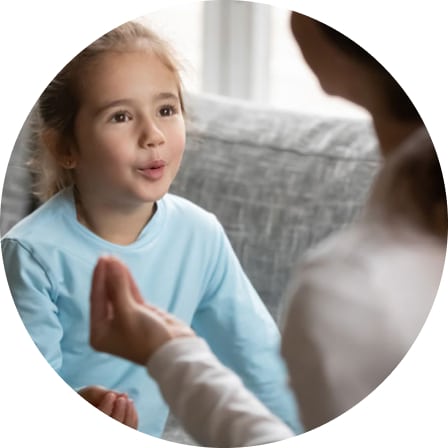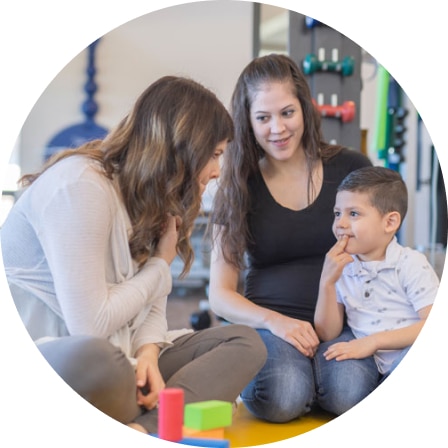What Does a Speech-Language Pathologist Do?
Speech-language pathologists (SLPs) evaluate a person’s speech, language, cognitive, communication and swallowing skills in order to diagnose a speech, language, and/or swallowing disorder.
The SLP will likely evaluate the following categories:
- Understanding and use of different words
- Correct use of words, incorrectly formed sentences
- Use of language for different purposes
- Pronunciation of speech sounds
- Physical ability to produce speech
- Voice quality
- Fluency or flow of speech
- Understanding the meaning of sounds and words
- Appropriate use of language for various contexts (pragmatic use of language)
- Narrative ability (the ability to tell or write a cohesive story)


Some of the Areas that Speech-Language Pathologists Address Are:
- Accent modification
- Alternative and augmentative communication
- Apraxia
- Aphasia
- Articulation
- Auditory training
- Autism
- Childhood apraxia of speech (CAS)
- Cognition
- Developmental delays
- Dysarthria
- Dysphasia
- Executive Function
- Gender affirming therapy
- Language processing
- Phonological disorders
- Late talkers or delayed speech milestones
- Motor speech
- Neurogenic disorders
- Social pragmatic communication disorders
- Stuttering
- Swallowing/dysphagia
- Vocal nodules and other voice issues
How to Prepare for a Speech-Language Evaluation
1. Schedule an Appointment
Everyone, both children and adults, experiencing issues with their communication, swallowing, voice, or speech can benefit from a speech-language pathology visit.
2. Discuss Your Concerns
After you complete the required paperwork, you and one of our speech-language pathologists will speak by phone to review your medical history and discuss your concerns related to speech, language, social, or feeding/swallowing difficulties.
3. Complete an Assessment
Depending on the age of the patient and the specific concerns, your speech-language pathologist may perform a number of assessments, including play-based activities (for young children) or structured standardized tests specific to your concerns.
4. Develop a Treatment Plan
Your personal goals, history and assessment results will be used to develop a custom-made treatment plan with clear objectives and expectations.
Every person’s communication needs are unique to them. Our customized treatment plans work with each individual’s comfort and ability levels. Goals are determined together and are adjusted as needed throughout the course of treatment.

Frequently Asked Questions
When should I be concerned about my child’s language development?
Parents often are given advice by friends, family, or professionals to ‘wait and see’ regarding their toddler’s language development. At Speech & Hearing Associates, we recommend a full speech-language evaluation if you are concerned with your child’s development.
Your child may fall within the typical range for their age even if their language skills appear low when compared to siblings or classmates. In this case, an evaluation would provide peace of mind and explanation by a certified speech-language pathologist regarding their strengths and needs.
If your child does, however, require services, then early intervention has been proven to lead to better outcomes – ‘the earlier, the better!’
A typical evaluation at Speech & Hearing Associates takes approximately forty to ninety minutes. Initial evaluations are commonly covered by insurance. If you have concerns regarding the number of words in your toddler’s vocabulary, their ability to use words to communicate their wants/needs, or their ability to combine words, it is worth it to come in and see if your child could benefit from services. Parents and families know their child best – if you have concerns, please trust your instincts and contact our offices to set up an evaluation.
If my child had their hearing tested at our pediatrician’s office, why do they need to have their hearing tested by an audiologist?
Best practices require that each child seen for a speech-language evaluation or for speech therapy must have a recent comprehensive audiological evaluation in his/her chart.
We are often told by parents that their child was recently “tested” by the pediatrician and that his/her hearing is fine. However, the fact is that “testing” at a pediatrician’s office often includes otoacoustic emissions (OAEs), a pure tone hearing screening, and/or tympanometry. Neither of these, alone or in combination, constitutes a comprehensive audiological evaluation.
Many pediatricians use OAEs only. However, OAEs do not test hearing. Rather, they assess the integrity of the cochlear outer hair cells. A child can have up to a 35-40 dB hearing loss and still pass an OAE. OAEs are used in newborn nurseries to rule out significant cochlear pathology, not to “test hearing.”
Tympanometry, likewise, does not test hearing. Tympanometry assesses the integrity of the middle ear system. Our audiologists frequently see normal tympanograms even when children have conductive hearing loss or sensorineural hearing loss.
Pure tone screening done in a pediatrician’s office is often done using a combination otoscope/pure-tone screener. The screener typically has two presentation levels: 25 and 40 dB. We have heard GOOD pediatricians say that they screen at 40dB because their office is too loud to screen at 25! This procedure nullifies the validity of the screening altogether. Keep in mind that normal hearing for a child is 15 dB or better! Patients with a 40 dB hearing loss need hearing aids!
Pediatricians do not measure hearing sensitivity for speech or other measures that constitute a comprehensive audiological evaluation.
In order to make an appropriate speech and language diagnosis and to plan treatment (if indicated), our speech-language pathologists MUST know how your child hears. The only way to obtain this information is with a comprehensive audiological evaluation administered by an audiologist. We can easily schedule your child for this evaluation with one of our audiologists. However, if you choose to have the comprehensive audiological evaluation completed elsewhere, or have had it done within the past year, we must have a copy of the report and will ask you to complete a records release form so we can obtain the report.
Do you offer bilingual speech services?
Yes! We have many speech-language pathologists that can provide bilingual speech services in the following languages:
- English
- Gujrati
- Hindi
- Korean
- Portuguese
- Spanish
There are some restrictions on services that may apply for our bilingual providers (i.e., can only treat young children). For more information on our bilingual services, please contact our office.